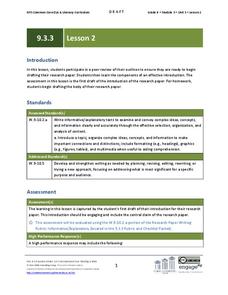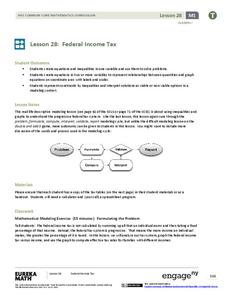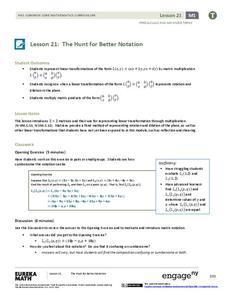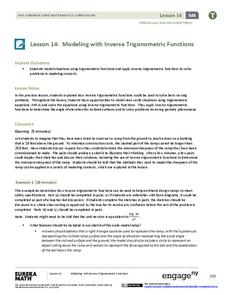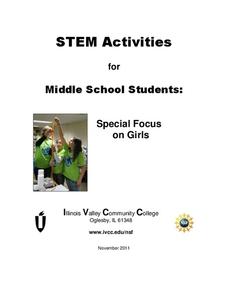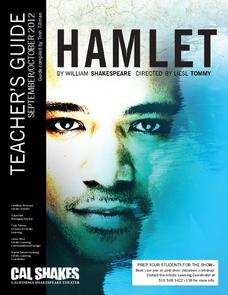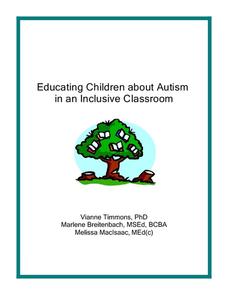EngageNY
Grade 9 ELA Module 3, Unit 3, Lesson 2
After a peer review of their outlines, class members examine a model of an effective, engaging introduction and then craft the first draft of the introduction to their research paper.
EngageNY
Solving Logarithmic Equations
Of course you're going to be solving an equation—it's algebra class after all. The 14th installment of a 35-part module first has pupils converting logarithmic equations into equivalent exponential equations. The conversion allows for...
EngageNY
Discovering the Geometric Effect of Complex Multiplication
Does complex number multiplication have the class spinning? Here's a resource that helps pupils explore and discover the geometric effect of multiplying complex numbers. In the 14th installment in the 32-part unit groups look at the unit...
EngageNY
Equations Involving a Variable Expression in the Denominator
0/0 doesn't equal 0! Begin this lesson by allowing the class to explore the concept of dividing by zero. The introduction allows for discovery and provides meaningful examples of dividing by zero. This understanding leads to solving...
Novelinks
Walk Two Moons: Anticipation Guide
Before you begin a unit on Sharon Creech's Walk Two Moons, introduce class members to the literary themes of the book with an anticipation guide. As they read through ten sentences that address different aspects of the plot,...
Teach Engineering
Maximum Power Point
Investigate the maximum power output of a photovoltaic panel with a lesson that introduces the class to the maximum power point. Individuals learn how to determine the maximum power point of a solar panel by using Ohm's law and the power...
EngageNY
Applications of Systems of Equations and Inequalities
Is the application of systems of equations giving your class headaches? Use this resource to build on your pupils' logic to lead them to building equations and using algebraic methods. The instructional activity begins with an...
EngageNY
Federal Income Tax
Introduce your class to the federal tax system through an algebraic lens. This resource asks pupils to examine the variable structure of the tax system based on income. Young accountants use equations, expressions, and inequalities to...
EngageNY
The Hunt for Better Notation
The matrix — it's not just a movie. The lesson introduces the concept of 2 x 2 matrix multiplication as a way to represent linear transformations. Class members determine when a linear transformation represented as matrix...
EngageNY
Special Triangles and the Unit Circle
Calculate exact trigonometric values using the angles of special right triangles. Beginning with a review of the unit circle and trigonometric functions, class members use their knowledge of special right triangles to find the value...
EngageNY
Modeling with Inverse Trigonometric Functions 2
Use inverse trigonometric functions to work with ramps, rabbits, and Talladega. The class models real-world situations with trigonometric functions and solves them using inverses in the 15th installment of a 16-part series. Pupils solve...
Illinois Valley Community College
STEM Activities for Middle School Students
Use STEM activities within the class to provide connections to concepts. The resource includes activities that range from working with buoyancy to building rockets and launching them. Other activities involve the engineering design...
California Shakespeare Theater
Hamlet Teacher's Guide
Even those experienced teachers of Hamlet can find much to like in a guide that offers many fresh ideas for activities. Class members may take on the role of FBI profilers that investigate Claudius and Hamlet as murderers, or...
Intel
Fair Games
Who said things were fair? The unit introduces probability and its connection to fairness. The class interacts with activities of chance and plays games to relate them to fairness. Groups design a fair game and develop a presentation....
Elizabeth Murray Project
The Education of Women in Colonial America
What educational opportunities were available to women during the colonial era in American history? How did the opportunities available to women differ from those for men? To answer this question, class members examine a series of...
Indiana Department of Education
Voting: It's Not a Spectator Sport!
Why is it important to vote? Who is eligible to vote? Why is it that some eligible voters do not vote? Class members conduct interviews with adults and other school mates before researching the eligibility requirements for their state,...
Advocates for Human Rights
Undocumented Immigrants
Stay or go? As part of a study of immigration and human rights, class members listen to the stories of several immigrants and must decide if the story was their own if they would stay in the United States as an undocumented...
Virginia Department of Education
Quadratic Curve of Best Fit
Class members create a table of the number of chords that can be drawn given the number of points on a circle. Pupils analyze the data created, find a function to fit to it, and use the function to make further predictions.
Curated OER
Educating Children about Autism in an Inclusive Classroom
How do we meet the needs of learners with autism? Find out with an in-depth study that offers a thorough explanation of autism—what it is and how unique every individual's case may be, nine lesson plans spanning from...
Do2Learn
Sharing Materials
If you've ever broken up an argument about a toy or classroom item, you know how difficult it is to convince class members to share. The concept is even more complex for those with autism spectrum disorder and for learners who have...
Do2Learn
Sharing Space
Interacting with peers can be difficult for many children and adults with autism spectrum disorder. Guide them through a collaborative activity, during which class members come up with self-care solutions to a scenario in which they...
EngageNY
Chance Experiments
Class members are introduced to probability using terms such as impossible, unlikely, likely, and certain. Numbers between zero and one are associated with the descriptions of probability. Pupils find the likelihood of chance experiments...
Virginia Department of Education
Linear Curve of Best Fit
Is foot length to forearm length a linear association? The class collects data of fellow scholars' foot length and the length of their forearms. They plot the data and find a line of best fit. Using that line, they make predictions of...
EngageNY
Grade 9 ELA Module 3, Unit 3, Lesson 4
The fourth activity in a unit on crafting a research paper focuses on cohesion within and between paragraphs. Class members examine models that lack cohesion and ones that are cohesive and logically developed before using what they have...
Other popular searches
- Taxonomy
- Classical Music
- Bloom's Taxonomy
- Using Taxonomy
- Blooms Taxonomy
- Technology in the Classroom
- Classifications
- Classroom Management
- Math Classification
- Animal Classifications
- Classifying Triangles
- Classify
